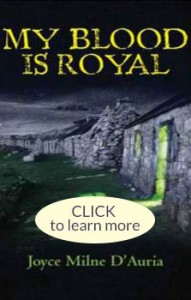Will They Let Me Back Into Scotland With My Mid-Atlantic Accent?

I will not be swimming in the River Forth
Then there is the hazard, when visiting abroad, of being perceived as an American. Well maybe it’s not a hazard, but it is awkward when I’m on Princes Street and someone assumes the responsibility, however kindly, to educate me about my native land. “That’s the castle up there on the hill.”
“Thank you,” I answer with enthusiasm.
Now, I’ve enjoyed visits to Edinburgh Castle since I was a wee lass, but I still stand in awe at the impressive fortifications, just like any tourist. I can still remember feeling the stillness creep over me as I stood in the tiny chapel in the centre of that majestic edifice when I was about the same age as the girl Queen Margaret who sought solace there back in the 13th century.
Looking over the battlements to the New Town, I am mesmerized.
“Is this your first trip over?” The inquiry is perfectly friendly so I hate to embarrass the young woman.
“Actually, I was born here.”
“Oh. Ye’ve lost yer accent.”
What to say? I really haven’t lost my accent; I remember where I put it, and I found it again when I had the opportunity to read the famous Robert Burns’ poem “Tam ‘o Shanter” at the Dunedin Reader’s Festival recently, in Florida … just in time.
I‘ve lived here longer than I lived in Bonnie Scotland, and I’m afraid I sound more like an American (except to Americans, who say, “Love your accent. What is it?”).
I’m neither “fish nor fowl” in the accent department. I like to say, in my defence, that I can be understood anywhere the English language is spoken.
This was very important when I arrived in Michigan, where I worked as a nurse, several decades ago. My skills were more than adequate, being a proud graduate of the prestigious Glasgow Royal Infirmary School of Nursing! Of course, you’d expect the rest of the world to understand a perfectly satisfactory West of Scotland tongue spoken slowly and deliber-r-r-rately, but I soon learned that my communication style needed modification and my burr needed softening, as my patients were American weans.
I’m not sure how much comfort they took from, “Och, ye’ll be fine. Don’t greet. Wheesht! Here’s a wee sweetie,” if they didn’t understand it.
But … when I said, “Stay still. I’m just goin’ tae give ye a wee jag,” they were totally unprepared and outraged at the pain that was delivered to their innocent wee bottoms. SO. I learned to say, “Take the medicine and you’ll get this candy,” and, “Hold still, this li’l shot isn’t gonna’ hurt.” I became “bilingual” through compassionate necessity.
Many years of participation in community theatre further developed my dialect variations, but no matter how carefully I wrap my tongue around it, my pronunciations of “look,” “book,” “took,” and especially “food” don’t sound right on either side of the pond anymore.
In my defence, the word “toe-may-toe” has never passed my lips, and I can still say, “It’s a braw, bricht moonlit nicht the nicht.”
To add to my Scots resume: My shortbread is famous. I can concoct a pot of soup out of practically any ingredients AND I like haggis. Honest.
 Since I started writing Scottish historical fiction several years ago, my accent is becoming more discernible (according to my American-born daughter). I guess walking around all day fantasizing 19th century Highland and Lowland conversations might be the cause.
Since I started writing Scottish historical fiction several years ago, my accent is becoming more discernible (according to my American-born daughter). I guess walking around all day fantasizing 19th century Highland and Lowland conversations might be the cause.
A trip to Scotland this year, and a Scottish family wedding here in Florida, steeped me in a rich mixture of Glaswegian and Aberdonian and has probably placed my mid-Atlantic accent somewhere east of Greenland.
